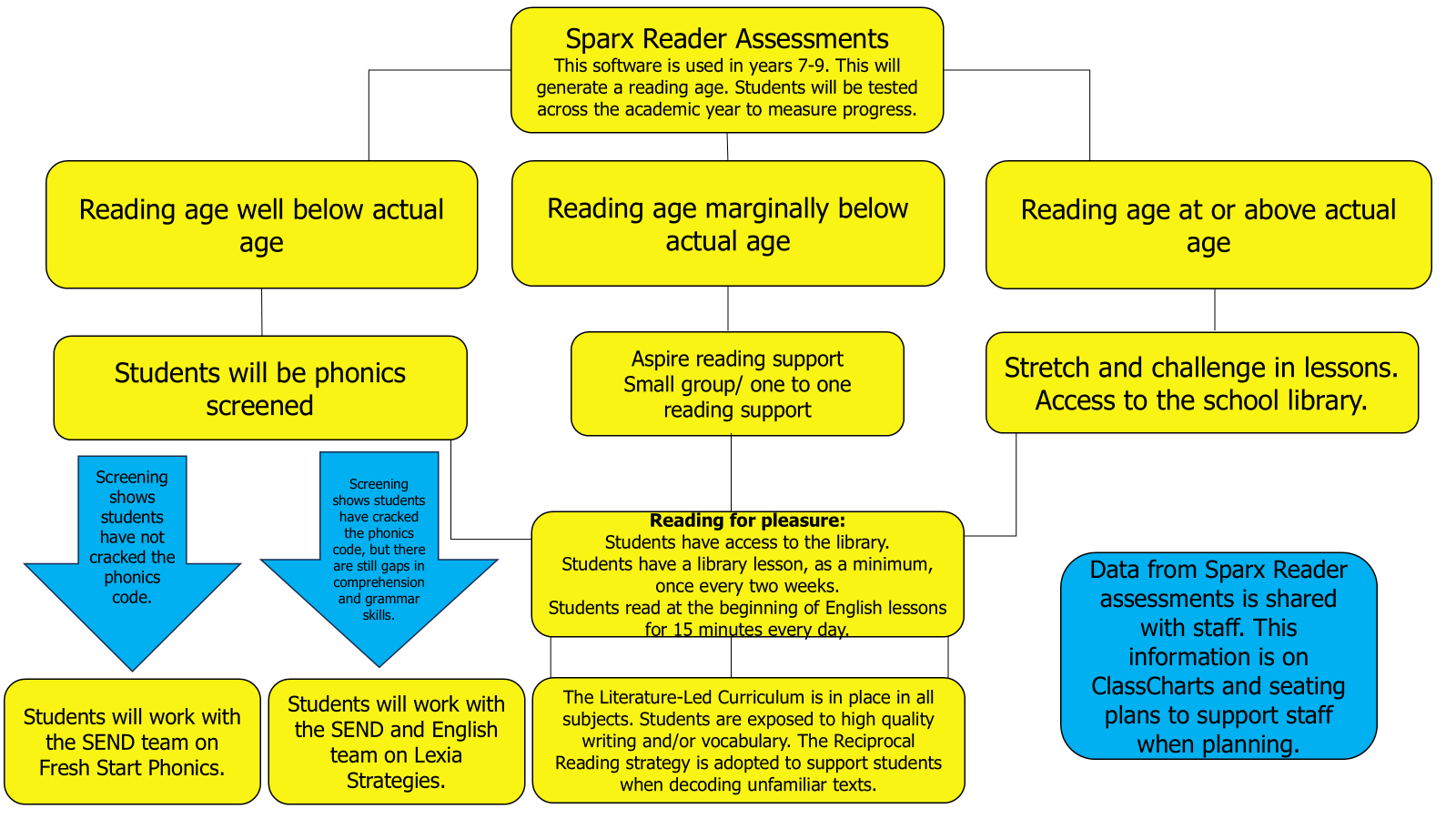Reading and Literacy at Campsmount Academy
The development of reading and literacy is a key priority for the academy. It is our belief that it is a basic requirement that all students leave school with the ability to read fluently, accurately and with confidence.
Aims:
- It is imperative that all students can read at the expected standard for their age before they leave the academy.
- To support students (with a particular focus on boys, SEN and disadvantaged pupils), staff must use their data strategically intervening with under-performing students in a timely and effective manner, whilst simultaneously stretching higher performing students.
- Reading and vocabulary instruction must be at the heart of teacher practice. All aspects of The High Five Reciprocal Reading Strategy should be evident in lessons, where reading material is integral to lesson design.
- The exposure, active planning and teaching of enriching academic texts must take place to effectively equip students for their GCSE examinations and later life.
- Reading for pleasure is the responsibility of all staff.

At Campsmount Academy, we adopt a number of strategies to support students with their reading.
1. Aspire Reading and Literacy
Every week, staff and students read a range of short stories, fiction and non-fiction texts. All texts are dyslexia friendly, age appropriate and explore current PSHE issues.
Students read for approximately 20 minutes every week during Aspire Reading, engaging with the text and reciprocal reading strategies, developing their comprehension skills.
Some students read in a small group, every week. This is to provide the opportunity for students to practise reading aloud in a safer space. Again, reciprocal reading strategies are adopted to activate prior knowledge, learn new vocabulary and increase the likelihood of successful comprehension.
2. New Group Reading Test
At the beginning of the academic year, students’ reading ability is tested on software provided by Sparx Reader. These tests will take place at key intervals across the academic year as detailed on the whole school calendar. The information generated from the software will be crucial in deciding which pathway our students follow, as described in the diagram below:

3. Fresh Start Phonics
When students complete the NRGT, it may be identified, alongside information from primary school, that students require some additional intervention to crack the phonics code more successfully. If this is the case, we have daily interventions running for those students to support them to bridge this gap as quickly as possible, so they can access the full curriculum with success.
4. The Literature-Led Curriculum
Curriculum maps identify keystone vocabulary and opportunities for wider reading. Reading and key vocabulary for schemes of work are identified and actively and explicitly taught throughout a scheme of work. Research states that students should be exposed to vocabulary repeatedly and through a range of strategies to support retention. It is the responsibility of all teachers to include these strategies in lessons. Directors of Faculty and Heads of Department must ensure that they are embedded in curriculum design. The Deputy Headteacher, responsible for literacy, alongside the Reading Lead, will support, monitor and quality assure the strategies described in curriculum intents and the implementation of these strategies with the view of measuring impact during key intervals across the academic year.
5. Drop Everything and Read Days
All departments will take part in DEAR Days and World Book Day activities. There are currently three events each year with a focus on oracy, reading for pleasure and writing. The English team also celebrate a number of national literacy events such as Roald Dahl Day, Banned Books Week and National Poetry Day.

6. Reciprocal Reading Strategies
All reading lessons should be structured around Reciprocal Reading Strategies. This is a metacognitive strategy that is key to supporting students and their ability to decode and comprehend a text. These strategies should be evident when reading key extracts, case studies and exam questions. To use one aspect in isolation, deconstructs the strategy and is less effective.
7. Lexia Reading Strategies

Lexia Power Up Literacy is also offered to support our developing readers. Students access this programme a minimum of three times a week, in 20 minute intervals. It is a type of software designed to assist in the rapid acquisition of reading and literacy skills in an engaging and consistent way.
The software ensures teachers and students are supported in the following areas to allow goals to be met:
- Assessment without Testing: real time, actionable data is provided as pupils work independently. This informs planning and evidences the effectiveness of the intervention, allowing resources to be allocated appropriately.
- The Auto Placement feature, allows large groups of students to be levelled at the correct starting point within the programme. This is achieved by the student independently taking a short user-friendly assessment.
- Independent personalised learning: using Intelligent Branching technology adapts to offer additional support wherever a student struggles. Teachers are informed, and appropriate paper-based activities are suggested from within the system if instruction is required.
- Recording: Progress reports are provided at school, class or individual level to help track the effectiveness of your reading curriculum and direct targeted instruction. Lexia provides a set of consistent measures between classes or even clusters of schools.
- Students enjoy using the programme due to its interactive nature and ‘game’ centred activities. They also like to see the personal progress they are making.
- The programme allows students to be tracked effectively so that progress can be easily measured.
8. Sparx Reader
At KS3, students are set reading homework every week through the platform Sparx Reader. Students are expected to complete a minimum of 20 minutes of reading every week. They will be asked about the book they're reading every Tuesday when they enter school. Students at the top of the league table, with the highest Sparx Reader Points, are rewarded throughout the year.
Students can access the library every day to complete their homework.
This software is excellent as it allows our students to read at home, for parents to see their engagement with reading and for us to see this too.
